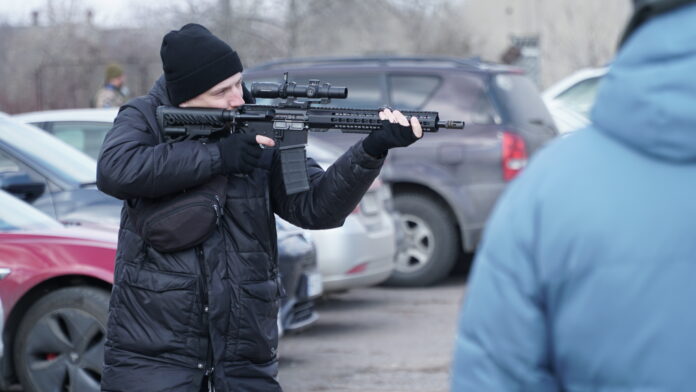When Alex Tkachev retired from his career as an IT consultant in 2013, he took up recreational shooting as a hobby. Now he’s standing in a parking lot near his home in Odesa, Ukraine, training a group of civilians to use Kalashnikov rifles to kill Russian soldiers.
“There are very many people who want to protect their homes, their country, their city,” Tkachev said.
Ukrainian civilians in the city of Odesa receive a one-day weapons training course in preparation for an expected Russian attack.
Jeff Semple / Global News
Tkachev is an instructor at a military training school in Odesa, about 130 kilometres west of Mykolaiv, where Russian forces are fighting for control. Odesa is widely expected to be one of Vladimir Putin’s next targets.
On this frigid March morning, Tkachev’s students — a group of about 20 Ukrainian men ranging in age from 25 to 55 — stand hunched in the wind, their cold hands stuffed in their pockets. They take turns anchoring the butt of the rifle against their shoulder.
Alex Tkachev is an instructor at a military training school in Odesa.
Jeff Semple / Global News
Asked whether a single day of firearms training will provide protection against professional Russian soldiers, Tkachev is candid.
“It’s a very difficult question,” he told Global News. “This is something that everyone should decide for himself. But I think that many of these guys understand that if this fight happens, this will be their last fight.”
One of his students is a man named Kirill, a married father of two young daughters. Fighting aged men aren’t allowed to leave Ukraine and Kirill said his wife is refusing to leave without him.
“It’s hard,” he said, his eyes welling up. “But we are ready to fight for our families. (The Russians) don’t have the same spirit we have.”
Kirill, left, is a married father of two young daughters, learning to use a firearm in Odesa, Ukraine.
Jeff Semple / Global News
That fierce defiance in the face of a looming Russian advance might seem surprising from a city that has long been considered friendly to Moscow. Odesa is Ukraine’s third largest city and home to a predominantly Russian-speaking population. The historical and cultural ties that bind Odesa and Russia are centuries old.
Trending Stories
‘It is time to talk’: Zelenskyy warns Moscow of losses in Ukraine without peace deal
As Ukrainians fleeing war quickly enter U.S., Russians blocked at Mexican border
As Russian President Vladimir Putin said again on Friday, his so-called ‘special military operation’ is designed to liberate Ukraine’s Russian-speaking population from a “genocide.”
But even as Putin addressed the crowd inside a Moscow soccer stadium, protests were breaking out in the Russian-speaking city of Kherson against their new Russian occupation. The mayor of Russian-speaking Odesa denounced Putin’s pretext for invasion.
“Claims that Russian-speakers are under threat in Ukraine are complete lies and propaganda,” Mayor Gennadiy Trukhanov told Global News.
Mayor of Odesa Gennadiy Trukhanov said the Kremlin’s claims that Russian-speakers are under threat in Ukraine amount to lies and propaganda.
Jeff Semple / Global News
“I have deep disappointment and regret in Russia’s decision. I have no words to explain the reason for the attack on our country,” he said.
That outright rejection of Putin’s narrative is remarkable from Odesa’s mayor, according Polina Sinovets, an international relations expert at Mechnikov National University. The mayor, a former Soviet military officer turned politician, has faced criticism in the past for his alleged close ties to the Kremlin.
“I think that Putin is the biggest unifier of Ukraine,” Sinovets said. “It cannot last like this anymore, after he invaded Ukraine, after he started killing Ukrainian children in Russian-language cities.”
Since Russia’s invaded Ukraine, the Russian-speaking city of Odesa in southern Ukraine has been covered in Ukrainian flags.
Jeff Semple / Global News
Sinovets said Putin’s aggression has turned Ukraine’s Russian-speaking residents against him. And the signs of surging Ukrainian patriotism aren’t hard to find.
In three weeks, Odesa has become blanketed in Ukrainian flags, including one draped on a statue of the city’s Russian founder, Catherine the Great.
A Ukrainian flag is draped on a statue of Odesa’s Russian founder, Catherine the Great.
Jeff Semple / Global News
“The big mistake is to see that Russian language somehow defines belonging to the Russian state,” Sinovets explained.
Ukrainian flags flying in the southern city of Odesa, known as the ‘Pearl of the Black Sea.’.
Jeff Semple / Global News
When asked whether she would be willing to leave the city or accept Russian rule, the Russian-speaking political expert is overcome with emotion.
“It’s very painful,” she said, explaining that her family has lived in Odesa for three generations. “It’s my home where I feel comfortable, where I feel useful, needed and free.”
There are many moments like that in this city, where people in mid-conversation suddenly break down in tears; A city on edge, its residents bracing for the fight of their lives.



